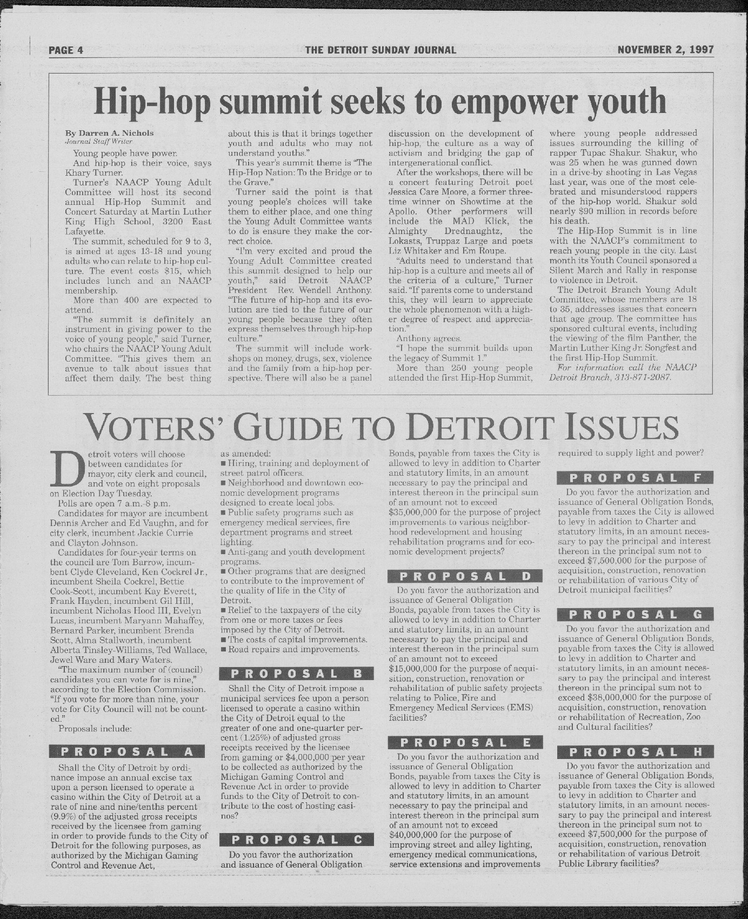Detroit Sunday Journal: Volume 2, Edition 51 (lost pages of tabloid newspaper; 1997): Difference between revisions
m (Changed writing slightly and changed category) |
No edit summary |
||
| (5 intermediate revisions by 4 users not shown) | |||
| Line 1: | Line 1: | ||
{{InfoboxLost | {{InfoboxLost | ||
|title=<center>Detroit Sunday Journal: Vol. 2, Iss. 51 first three pages</center> | |title=<center>Detroit Sunday Journal: Vol. 2, Iss. 51 (first three pages)</center> | ||
|image=DSJ_surviving_paper.png | |image=DSJ_surviving_paper.png | ||
|imagecaption=Page four of the Detroit Sunday Journal's Nov. 2, 1997 edition. | |imagecaption=Page four of the Detroit Sunday Journal's Nov. 2, 1997 edition. | ||
|status=<span style="color:red;">'''Lost'''</span> | |status=<span style="color:red;">'''Lost'''</span> | ||
}} | }} | ||
The ''Detroit Sunday Journal'' was a tabloid newspaper serving the American city of Detroit, Michigan that published solely on Sundays from November 19, 1995 to November 21, 1999 by striking workers of the city's two major newspapers, The Detroit News and Detroit Free Press. Even though the Detroit Newspaper Strike ended in 1997, it continued publishing for two more years afterward and ended up being one of the longest-running "temporary" newspapers ever published. It had a strong pro-union focus and mainly featured labor issues alongside local stories.<ref>[https://en.wikipedia.org/wiki/Detroit_Sunday_Journal Wikipedia article on the Sunday Journal] Retrieved September 19, 2016</ref> | |||
Even though all of the newspaper's 200+ editions<ref>[https://digital.library.wayne.edu/digitalcollections/item?id=wayne:collectionDSJ Sunday Journal page on WSU Library's Digital Collections website] Retrieved September 19, 2016</ref> have been preserved by the Wayne State University Library and are viewable on their website, '''the first three pages of Volume 2, Edition 51''' (published on November 2, 1997) were not preserved and [https://digital.library.wayne.edu/digitalcollections/item?id=wayne:DSJv2i51DSJ19971102 are shown as "page missing" when viewed on the website collection], with the remaining pages being available. | |||
Even though all of the newspaper's 200+ editions<ref>[https://digital.library.wayne.edu/digitalcollections/item?id=wayne:collectionDSJ Sunday Journal page on WSU Library's Digital Collections website]</ref> have been preserved by the Wayne State University Library and are viewable on their website, '''the first three pages of Volume 2, Edition 51''' (published on November 2, 1997) were not preserved and [https://digital.library.wayne.edu/digitalcollections/item?id=wayne:DSJv2i51DSJ19971102 are shown as "page missing" when viewed on the website collection], with the remaining | |||
Stories that are known to have begun on the missing pages include one where a judge ruled that the striking newspaper workers would be eligible for unemployment checks (which was continued on page six), one about controversy regarding a new housing project that was near Detroit's water treatment plant (continued on page eight), one about funding issues with a local school district (also continued on page eight), and one about a document listing free parking spots within Detroit (continued on page nine). | Stories that are known to have begun on the missing pages include one where a judge ruled that the striking newspaper workers would be eligible for unemployment checks (which was continued on page six), one about controversy regarding a new housing project that was near Detroit's water treatment plant (continued on page eight), one about funding issues with a local school district (also continued on page eight), and one about a document listing free parking spots within Detroit (continued on page nine). | ||
| Line 18: | Line 17: | ||
[[Category:Lost literature]] | [[Category:Lost literature]] | ||
[[Category:Completely lost media]] | |||
Latest revision as of 00:13, 9 May 2020
The Detroit Sunday Journal was a tabloid newspaper serving the American city of Detroit, Michigan that published solely on Sundays from November 19, 1995 to November 21, 1999 by striking workers of the city's two major newspapers, The Detroit News and Detroit Free Press. Even though the Detroit Newspaper Strike ended in 1997, it continued publishing for two more years afterward and ended up being one of the longest-running "temporary" newspapers ever published. It had a strong pro-union focus and mainly featured labor issues alongside local stories.[1]
Even though all of the newspaper's 200+ editions[2] have been preserved by the Wayne State University Library and are viewable on their website, the first three pages of Volume 2, Edition 51 (published on November 2, 1997) were not preserved and are shown as "page missing" when viewed on the website collection, with the remaining pages being available.
Stories that are known to have begun on the missing pages include one where a judge ruled that the striking newspaper workers would be eligible for unemployment checks (which was continued on page six), one about controversy regarding a new housing project that was near Detroit's water treatment plant (continued on page eight), one about funding issues with a local school district (also continued on page eight), and one about a document listing free parking spots within Detroit (continued on page nine).
It's unknown how or why these pages haven't been archived, or even whether WSU Library have said pages and decided not to put them in the archive for some reason.
References
- ↑ Wikipedia article on the Sunday Journal Retrieved September 19, 2016
- ↑ Sunday Journal page on WSU Library's Digital Collections website Retrieved September 19, 2016
